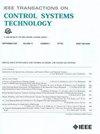用于船用内燃机传感器故障诊断的分布式网络-物理框架
IF 3.9
2区 计算机科学
Q1 AUTOMATION & CONTROL SYSTEMS
引用次数: 0
摘要
本文提出了一种基于分布式模型的方法,用于诊断影响用于船用内燃机(ICE)状态监测和控制的多个传感器的故障。为了应对内燃机的复杂性,我们将其视为一组相互连接的物理子系统,这些子系统构成了物理层。对于每个子系统,传感器故障的检测都依赖于网络代理的设计,其中每个代理监控一个子系统。为了在故障检测决策过程中处理每个子系统的异构动态,每个代理都使用微分和代数残差以及自适应边界。为达到隔离目的,采用了组合决策逻辑,在两个网络层次上实现:局部决策逻辑和全局决策逻辑。前者旨在根据本地代理故障特征和某些二进制决策矩阵,识别可能影响发动机的所有传感器故障模式。全局决策逻辑用于捕捉传感器故障在不同监控代理之间的传播。仿真结果用于展示所提出的方法在解决问题方面的效率及其适用性。本文章由计算机程序翻译,如有差异,请以英文原文为准。
A Distributed Cyber-Physical Framework for Sensor Fault Diagnosis of Marine Internal Combustion Engines
This article proposes a distributed model-based methodology for the diagnosis of faults affecting multiple sensors used for condition monitoring and control of marine internal combustion engines (ICEs). To handle the complexity of the ICE, we consider it as a set of interconnected physical subsystems that constitute the physical layer. For every subsystem, the detection of sensor faults relies on the design of cyber agents, where every agent monitors one subsystem. To handle the heterogeneous dynamics of each subsystem in the fault detection decision-making process, each agent uses differential and algebraic residuals alongside adaptive bounds. For isolation purposes, a combinatorial decision logic is employed, realized in two cyber levels: the local and the global decision logic. The first aims at the recognition of all sensor fault patterns that might have affected the engine based on the local agent fault signatures and certain binary decision matrices. The latter is used to capture the propagation of sensor faults between the different monitoring agents. Simulation results are used to showcase the proposed methodology’s efficiency in tackling the problem and its applicability.
求助全文
通过发布文献求助,成功后即可免费获取论文全文。
去求助
来源期刊

IEEE Transactions on Control Systems Technology
工程技术-工程:电子与电气
CiteScore
10.70
自引率
2.10%
发文量
218
审稿时长
6.7 months
期刊介绍:
The IEEE Transactions on Control Systems Technology publishes high quality technical papers on technological advances in control engineering. The word technology is from the Greek technologia. The modern meaning is a scientific method to achieve a practical purpose. Control Systems Technology includes all aspects of control engineering needed to implement practical control systems, from analysis and design, through simulation and hardware. A primary purpose of the IEEE Transactions on Control Systems Technology is to have an archival publication which will bridge the gap between theory and practice. Papers are published in the IEEE Transactions on Control System Technology which disclose significant new knowledge, exploratory developments, or practical applications in all aspects of technology needed to implement control systems, from analysis and design through simulation, and hardware.
 求助内容:
求助内容: 应助结果提醒方式:
应助结果提醒方式:


